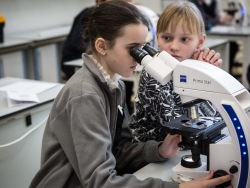Growing up at the Aquarium.

A new large-scale project, Growing up at the Aquarium, has been launched this autumn. The educational program is designed for children of different ages. In the framework of the project pupils will pass through a number of learning stages and get information from various fields of marine biology. The project implies the continuous study of marine biology by children from preschool age through high school age and consists of four stages.
The first of them is “Belyok”, an environmental biology studio for children aged 5 to 7. “In our studio children get acquainted with such professions as biologist-diver, marine mammal trainer, marine biologist, paleontologist, ichthyologist that are related to providing the aquatic dwellers of the Aquarium with comfortable living conditions,” says Tatiana Chernykh, Chief Specialist of the Environmental Education Center at the Primorsky Aquarium. “One of the main goals of the kids’ studio is to instill a positive attitude to the environment in children. Since most studio alumni want to know more about the aquatic world and its inhabitants, the specialists of our center have broadened the program by adding new learning stages. “
The second stage, “Young ichthyologist”, is aimed at children aged 7-8. During the classes held by the Senior Specialist of the Environmental Education Center Platon Ostashkin, children will “dive” into the world of aquarium fish to become familiar with their behaviors. The pupils will learn how to produce conditions favorable to certain fish species and collectively choose plants and fishes to add to their common fish tank which will be later placed at one of the Aquarium’s exhibits. The author of the program sincerely believes that a child who is deeply involved in creating a habitat comfortable for his/her pet fish and knows special aspects of its keeping will never do any harm to it.
The following stage, a “Man and Sea” art studio, is designed for children at the age of 9-10. Its purpose is to cultivate empathy in a child. Pupils will learn about the harmony of the surrounding world and see the beauty of marine inhabitants. With the help of collaborative and individual art projects children will understand how to tell people about the problems of the World Ocean, and what each individual can do to protect it.
“Aqua Laboratory”, the fourth stage of the project, invites schoolchildren aged 11 and older and is intended to develop personal responsibility and team working skills in children. According to Liubov Gliznutsa, Lead Specialist of the Environmental Education Center at the Primorsky Aquarium, the classes will be held in the Aquarium’s learning laboratories equipped with research microscopes. Children will study microscopic organisms constituting plankton and investigate a complex life cycle of marine invertebrates and specifics of their anatomy.
One of the “Aqua Laboratory” sections is dedicated to the evolution of life in the ocean. Using the paleontological collection and exhibits of the Aquarium, pupils will trace how anthropods, mollusks and chordates have been changing in the course of millions of years. The stage also includes paleontological excursions to the Zhitkov Peninsula of Russky Island where Triassic layers crop out. A separate section of the program deals with dinosaurs and ichthyosaurs, and the final part of the stage is dedicated to man and his place on Earth.
The Growing up at the Aquarium classes are provided free of charge and take place several times a week.
“As the “Belyok” alumni showed a keen interest in the marine biology, we have decided to launch a project that will allow children to constantly obtain new knowledge on the subject. We are going to bring up small biologists, starting with children of preschool age, and from year to year our pupils will follow the project stages and grow up at the Aquarium”, says Olga Shevchenko, Head of the Research Support Office. “Then the baton of their educational relay race will be passed to the Junior Academy of Marine Biology which has been working with high school seniors for 40 years. And even if in future our alumni choose some other professions, not connected with natural sciences, they will turn into environmentally educated people taking good care of our planet.”